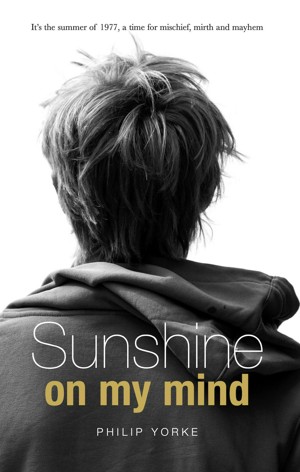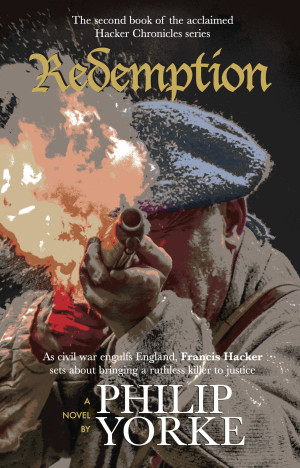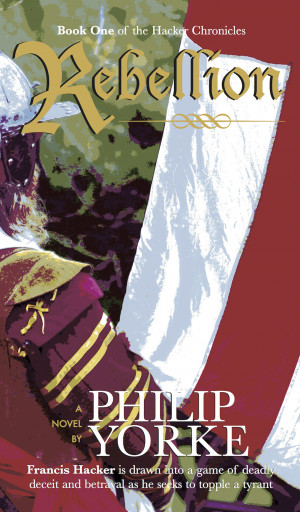Interview with Philip Yorke
Published 2020-02-19.
Do you remember the first story you ever wrote?
A couple celebrating their 60th Wedding Anniversary were the subject of the first story I ever penned – in the 1980s when I was a junior reporter for a local newspaper called The Hinckley Times.
My job was to extract an "interesting line" from the couple that would sit comfortably in the middle section of the paper. In the end, after more than two hours, I discovered I was talking to a Second World War hero who had won the Distinguished Flying Cross during the Battle of Britain.
What is your writing process?
I like to go into "forensic mode!"
This means I do my best to research the subject thoroughly, compiling a detailed timeline of the period under my microscope. I log all of the key national and local events that have an impact on my macro story. This gives me (potentially) a natural line to pursue. I then have the simple task of working out an effective plot, and filling in the gaps identified on the timelines, to create a credible and compelling story.
The truth is there are a lot of resources for writers to use – particularly if you are looking into the seventeenth century (like I am). For example, there are many books from the time that can be accessed free of charge online. They were published during the period, or shortly afterwards, and they are overflowing with information.
Once my timeline is complete, then I begin the process of writing. And, as my books are written in the first person, I have to imagine I am the person I am writing about. This is easier written than done in practice. But the more invested in the story I become, the easier it gets.
Do you remember the first story you ever read, and the impact it had on you?
The Lion, the Witch and the Wardrobe.
Wow. I was eight-years-old, I knew nothing about religion, war, good versus evil or CS Lewis. But I was instantly mesmerised by the story.
I loved the book – albeit I was devastated at Aslan's demise – and couldn't wait to read the rest of the series, which I did in record time.
How do you approach cover design?
As a journalist, I became involved in the design and production of newspapers and magazines when I moved to Fleet Street and became part of the national press landscape.
This gave me an opportunity to learn about cover design, the use of photography and typography. So I try to be as closely involved in the process as I possibly can. This doesn't mean I take over the process. Fare from it. I simply try and ensure the cover conveys what the book is all about, is eye-catching, and is as original as it can be, albeit in a cluttered market this latter point is a hard ask.
I am also quite competent with design programmes like QuarkXPress, Adobe InDesign and Photoshop. So I am able to make practical changes to covers and text pages without the need to explain things to a graphic designer.
Overall, this skill set has been an asset most of the time!
What are your five favorite books, and why?
Cold Comfort Farm by Stella Gibbons
It was set close to where I live and is one of the funniest books I have ever read. To call it a classic is an understatement. And, in my humble opinion, everyone should read it at least once in their lifetime.
Scoop by Evelyn Waugh
Another classic. It's about the newspaper world long before social media and false news. And it even though the period being written about is of a bygone age, it captures the chaos, incompetence and craziness of journalism perfectly, leaving the reader chuckling as they turn virtually every page. And having been a hack and a desk editor myself, I can relate to a lot of the craziness Waugh conveys.
The Bible
I am a Christian. Enough said. But this book should be a must-read for every human being, regardless of whether you have faith, or not, in my humble opinion. If more people knew what the Bible says on a wide range of key subjects, then I really believe the world would be less confused and a happier place (albeit I do appreciate not everyone will agree with its teachings – and many will be fearful of the challenges we are all confronted with).
The Bruce Trilogy by Nigel Tranter
I love to read about the exploits of Robert the Bruce and William Wallace, and there isn't a better book to give me what I need in this regard than The Bruce Trilogy, written by the late (and great) Scottish writer, Nigel Tranter. The book charts the trials, tribulations and ultimate success of The Bruce as he seeks to wrestle control of his beloved country from his bitter rival, The Red Comyn, and Edward the First of England. Tranter'swell-scripted text takes the reader on a wonderful journey through the early part of the fourteenth century. It is my favourite book. One I recommend to anyone who likes historical fiction without hesitation.
The Matthew Shardlake series by CJ Sansom
These books have everything a reader could wish for and have to be the standard-bearer for any would-be historical fiction writer. I have read all of the books in the series and throughout, CJ Sansom has never disappointed. Every tome has been well researched and wonderfully written. If you aren't familiar with this author, I recommend you go and find him as soon as possible.
What do you read for pleasure?
At the moment, I am reading a lot of material on the English Civil Wars period – and the time of the English Republic. This means the works of Charles Spencer, Peter Ackroyd, Diane Purkiss and Geoffrey Roberston are all being thumbed through at the present time, as are many eye-witness accounts of the time.
Spencer's 'Killers of the King' is a particularly fine read – and the nuggets unearthed by Ackroyd in his 'Civil War' offering are more detailed than anything I have read before.
For pure escapism, I often also reach for Simon Scarrow's series about the exploits of Roman legionnaires Macro and Cato. And when I can, I also read the works of SJ Pariss, who has written a compelling series of books set in Elizabethan England about the action-packed life of main character, Giordano Bruno.
What is your e-reading device of choice?
My wife's Kindle Fire – but I have to confess to preferring a good old-fashioned book. You can't beat the smell of paper.
What book marketing techniques have been most effective for you?
Blogging (courtesy of third-party opportunities) and social media marketing (via Twitter and Facebook) seem to have paid dividends so far. Alignment with the best online third-party sales outlets has also been a significant consideration – and I am continuing to play my part in reaching out to the right distributors.
The market is so cluttered for most writers, it's important you remain patient, professional and tenacious. Don't lose heart. Be in it for the long-term.
My own perspective is I won't be in a position to 'crack it' until I have written the third book in the current series. So the marketing strategy reflects this. It is sympathetic to my daily commitments. As a result, I believe in it and I am prepared to commit wholeheartedly to the things I am required to do.
In addition, the pricing strategy of the book and ebook reflects my overall ambition. It enables anyone and everyone to take a speculative punt without getting their fingers burned.
The biggest challenge is finding a way to get readers to leave reviews, as these are critical for the first-time author. I have to confess to being a novice at the moment in this regard – but I remain hopeful I will stumble across some answers in the near future!
Describe your desk
I sit at a pine desk in my study – looking at my Apple Mac desktop and a hand-sketched portrait of my eldest daughter.
The desk is reasonably tidy, but I am always trying to do three things at a time, so there is a bit of paper strewn here and there.
At least two times a day, a large coffee mug will be found on the desk, as I indulge myself with a home-made Flat White, which aids my creativity!
Who has been the biggest influence on your writing career?
I first got to know a journalist called Bill Bradshaw in the 1990s, when he was a senior editor at Mirror Group Newspapers.
Bill headed up the sport's department at The People newspaper when I first worked for him and allowed me to write a hard-hitting investigation into the affairs of Alan Sugar (now Lord Sugar), Terry Venables and Tottenham Hotspur football club. It was to be run over a four-week period.
Up to this point in my writing career, I had never written a feature. I was a news reporter through and through – fearing the 2,000-word article as if it were the plague. My specialism was anything up to 1,000 words. And I did not want to go beyond.
Yet I had to if I was to be able to tell the story of the events that led to seismic problems for Sugar, Venables and Spurs.
Bill patiently dissected my stories, encouraging me to let my creativity flow – and believe in myself. He was incredibly positive and a wonderful writing mentor. He remains so to this day.
I have never forgotten his words and advice. And I have tried to apply them every time I have sat down in front of a keyboard, particularly when I penned Rebellion, my debut historical fiction novel.
What inspires you to get out of bed each day?
My wife wakes up at 06:30 every weekday morning (she is a teacher) and is out of bed within five minutes of the alarm going off. The lights are turned on, doors are opened, the noise of the shower being turned on comes from the en-suite, to be followed by the regular cry of "are you making me a cup of tea, darling?"
How could I possibly stay in bed when offered such an invitation!
Smashwords Interviews are created by the profiled author or publisher.
Books by This Author
Sunshine on My Mind
by Philip Yorke
Holidays are meant to be fun – and memorable.
Twelve-year-old Tony certainly thought so when he journeyed to East Yorkshire in the August of 1977, to spend two weeks with his aunts and uncles.
Little did anyone know at the time that it would be a vacation that would be talked about for many years – and not necessarily for all the right reasons!
Redemption (Book Two of the Hacker Chronicles Series)
by Philip Yorke
"As intricately and artfully interwoven as a spider's web" is how critics are hailing the acclaimed series about Francis Hacker, a Parliamentarian soldier in the British Civil Wars.
In Redemption, the second instalment, brave Hacker attempts to solve a murderous plot that, if successful, will have catastrophic and far-reaching consequences for those opposing the tyranny of Charles the First.
Rebellion (Book One of the Hacker Chronicles Series)
by Philip Yorke
Rebellion in a nutshell, courtesy of one appreciative reviewer:
"Gripping, gritty, and gory! You could live the battles of the Civil War through the descriptions. It was historically accurate and with it being written through the eyes of Francis Hacker, you sensed his pain and triumph in both his family life, the war, and his friendship with Oliver Cromwell."



